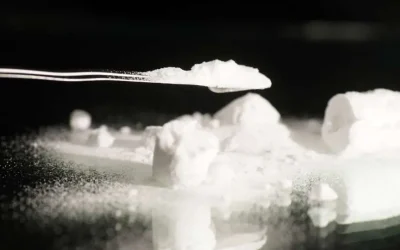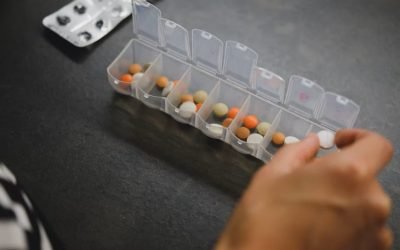Cocaine addiction is a complex and challenging condition that can have devastating effects on an individual’s physical, mental, and emotional well-being. As someone who has personally struggled with this addiction, I can attest to the immense challenges it presents. Cocaine is a highly addictive stimulant drug that can hijack the brain’s reward system, leading to a cycle of cravings, compulsive use, and ultimately, a profound impact on one’s quality of life.

Signs and Symptoms
Recognising the signs and symptoms of cocaine addiction is the first step towards seeking help and breaking free from its grip. Some of the common indicators of cocaine addiction include:
- Frequent and compulsive use of cocaine, despite negative consequences
- Increased tolerance, requiring more of the drug to achieve the desired effects
- Withdrawal symptoms, such as fatigue, depression, and irritability, when the drug is not available
- Neglecting important responsibilities, such as work, school, or family obligations, in favour of using cocaine
- Engaging in risky or illegal behaviour to obtain or use the drug
- Experiencing financial difficulties due to the high cost of the drug
- Experiencing physical side effects, such as rapid heartbeat, high blood pressure, and nosebleeds
If you or a loved one are experiencing these signs and symptoms, it is crucial to seek professional help to address the addiction and regain control of your life.
The Impact of Cocaine Addiction on Physical and Mental Health
Cocaine addiction can have a devastating impact on both your physical and mental health. Physically, the use of cocaine can lead to a range of issues, including:
- Cardiovascular problems, such as heart attacks, strokes, and arrhythmias
- Respiratory problems, such as lung damage and respiratory failure
- Gastrointestinal problems, such as abdominal pain, nausea, and vomiting
- Neurological problems, such as seizures, tremors, and headaches
Mentally, cocaine addiction can lead to a range of issues, including:
- Anxiety and paranoia
- Depression and mood swings
- Cognitive impairment, such as difficulty concentrating and memory problems
- Psychosis, including hallucinations and delusions
The long-term use of cocaine can also lead to significant and irreversible damage to the brain, including the loss of brain cells and the disruption of important neural pathways. This can have a profound impact on an individual’s cognitive and emotional functioning, making it even more challenging to overcome the addiction.
Seeking Help
Seeking help for cocaine addiction is a crucial step towards reclaiming your life. It’s important to understand that you don’t have to face this battle alone. There are numerous resources and support systems available to help you on your journey to recovery. One of the first steps you can take is to reach out to a healthcare professional, such as a doctor or a mental health counselor. They can provide a comprehensive assessment of your addiction and help you develop a personalised treatment plan. This may include a combination of medical interventions, such as medication-assisted treatment, and behavioural therapies, such as cognitive-behavioural therapy (CBT) or contingency management. In addition to seeking professional help, it’s also important to surround yourself with a strong support network. This may include family members, friends, or support groups, such as Cocaine Anonymous or SMART Recovery. These groups can provide a safe and judgment-free environment where you can share your experiences, learn from others, and receive the emotional support you need to overcome your addiction.
Treatment Options
There are several treatment options available for individuals struggling with cocaine addiction. The most effective approach often involves a combination of various interventions, tailored to the individual’s unique needs and circumstances.
- Detoxification: The first step in the treatment process is often medical detoxification, where the individual is monitored and supported as they go through the withdrawal process. This can help manage the physical and psychological symptoms of withdrawal and reduce the risk of relapse.
- Behavioural Therapies: Cognitive-Behavioural Therapy (CBT) and Contingency Management (CM) are two of the most widely used behavioural therapies for cocaine addiction. CBT helps individuals identify and modify the thought patterns and behaviours that contribute to their addiction, while CM uses positive reinforcement to encourage abstinence and healthy behaviours.
- Medication-Assisted Treatment: While there are no FDA-approved medications specifically for the treatment of cocaine addiction, some medications, such as antidepressants or anti-anxiety medications, may be used to help manage the symptoms of withdrawal and cravings.
- Residential Treatment: For individuals with severe or long-term cocaine addiction, residential treatment programs may be recommended. These programs provide a structured, drug-free environment, with around-the-clock support and access to a range of therapeutic interventions.
- Outpatient Treatment: Outpatient treatment programs allow individuals to continue their daily routines while receiving regular counselling and support. This can be a good option for those with less severe addiction or who have completed a residential program and are transitioning back into their everyday lives.
It’s important to note that the treatment approach that works best for one individual may not be the most effective for another. Working closely with a healthcare professional can help you determine the most appropriate treatment plan for your unique needs and circumstances.
Support Groups and Counseling for Cocaine Addiction
In addition to professional treatment, support groups and counselling can play a crucial role in the recovery process. Joining a support group, such as Cocaine Anonymous or SMART Recovery, can provide a sense of community, shared experiences, and accountability that can be invaluable during the recovery journey. These groups typically meet regularly and offer a safe, judgment-free environment where individuals can share their struggles, learn from one another, and receive encouragement and support. Participating in support group meetings can help individuals develop coping strategies, build a sober network, and stay motivated in their recovery efforts. Counselling, whether individual or group-based, can also be an important component of the recovery process. A qualified therapist or counsellor can help individuals explore the underlying causes of their addiction, develop healthy coping mechanisms, and work through the emotional and psychological challenges that often accompany addiction. Through counselling, individuals can gain a better understanding of their addiction, develop strategies for managing triggers and cravings, and build the skills and resilience needed to maintain long-term sobriety.
Overcoming Triggers and Cravings
One of the most significant challenges in overcoming cocaine addiction is managing triggers and cravings. Triggers can be anything from specific people, places, or events that can elicit a strong urge to use the drug. Cravings, on the other hand, are the intense physical and psychological desires to use cocaine, even in the absence of external triggers. To overcome these challenges, it’s essential to develop a comprehensive plan for identifying and managing triggers and cravings. This may involve:
- Identifying Triggers: Work with your healthcare provider or counsellor to identify the specific triggers that tend to lead to cravings and drug use. This can include environmental factors, social situations, or even certain emotional states.
- Developing Coping Strategies: Once you’ve identified your triggers, work on developing healthy coping strategies to manage them. This may include practising mindfulness or relaxation techniques, engaging in physical exercise, or seeking support from your network.
- Avoiding High-Risk Situations: In some cases, it may be necessary to avoid certain people, places, or events that are strongly associated with your cocaine use. This can help you minimise your exposure to triggers and reduce the risk of relapse.
- Seeking Support: Don’t try to overcome triggers and cravings alone. Reach out to your support network, including family, friends, or support groups, for encouragement and assistance in managing these challenges.
By developing a comprehensive plan for managing triggers and cravings, you can increase your chances of achieving long-term sobriety and reclaiming your life from the grip of cocaine addiction.
Rebuilding Your Life After Cocaine Addiction
Overcoming cocaine addiction is not just about achieving sobriety; it’s also about rebuilding your life and creating a fulfilling, meaningful existence. This process can be challenging, but with the right support and strategies, it is possible to reclaim your life and thrive in your recovery. Some key steps in the process of rebuilding your life after cocaine addiction include:
- Developing a Healthy Routine: Establishing a consistent, structured routine can help provide a sense of stability and purpose in your life. This may include regular exercise, healthy meals, and productive activities, such as work, school, or volunteering.
- Rebuilding Relationships: Cocaine addiction can often lead to the deterioration of important relationships. Rebuilding trust and mending broken bonds with family and friends can be a crucial part of the recovery process.
- Pursuing Hobbies and Interests: Engaging in hobbies and activities that you genuinely enjoy can help you rediscover your passions and interests, and provide a sense of fulfillment and purpose.
- Seeking Meaningful Work or Education: Finding a job or pursuing education that aligns with your values and interests can be a powerful way to rebuild your sense of purpose and self-worth.
- Practising Self-Care: Prioritizing your physical and mental well-being, through activities such as exercise, meditation, or therapy, can help you build the resilience and resources needed to maintain your recovery.
By taking these steps and actively investing in the process of rebuilding your life, you can not only overcome cocaine addiction but also create a fulfilling, purpose-driven existence that is truly your own.
Tips for Staying Sober and Preventing Relapse
Maintaining sobriety and preventing relapse is an ongoing process that requires vigilance, commitment, and the development of effective coping strategies. Here are some tips that can help you stay sober and avoid the pitfalls of relapse:
- Develop a Strong Support Network: Surround yourself with individuals who are committed to your recovery and can provide the encouragement, accountability, and practical support you need to stay on track.
- Engage in Ongoing Treatment and Counseling: Continued participation in therapy, support groups, and other recovery-oriented activities can help you maintain the progress you’ve made and address any emerging challenges.
- Manage Stress and Triggers: Develop a comprehensive plan for identifying and managing the specific triggers and stressors that may lead to cravings or relapse.
- Practice Self-Care: Prioritize your physical and mental well-being through activities such as exercise, healthy eating, and relaxation techniques.
- Celebrate Milestones and Successes: Acknowledge and celebrate the progress you’ve made, no matter how small. This can help you stay motivated and focused on your long-term recovery goals.
- Seek Help at the First Sign of Trouble: If you find yourself struggling with cravings or the temptation to use, don’t hesitate to reach out to your support network or healthcare provider for immediate assistance.
By consistently implementing these strategies and remaining vigilant in your recovery efforts, you can significantly reduce the risk of relapse and maintain the progress you’ve made in overcoming cocaine addiction.
Conclusion
Overcoming cocaine addiction is a challenging but ultimately rewarding journey. By understanding the nature of this addiction, seeking professional help, and developing a comprehensive plan for recovery, you can reclaim your life and build a fulfilling, sober existence. Remember, you are not alone in this struggle, and there are countless resources and support systems available to help you on your journey. With determination, resilience, and a willingness to seek help, you can break free from the grip of cocaine addiction and create a brighter, healthier future for yourself. If you or a loved one are struggling with cocaine addiction, don’t hesitate to reach out for help. Visit our website or call our hotline to learn more about our treatment programs and support services. Together, we can help you overcome this challenge and reclaim your life.
About Hacienda Paradiso
Hacienda Paradiso is the first ever fully eco rehab in Spain, located in the south of Spain, near the city of Málaga. Our in-patient treatment center coexists with surrounding ecosystems in an area of outstanding natural beauty inside a natural park.
At Hacienda Paradiso we believe in a safe and healing environment with a mixture of therapeutic and holistic therapies in the natural surroundings of nature. There is an answer for everything and we find the solution. Each and every person is different, so each addiction is too. We are able to help you because we adapt all our expertise to your personal situation – with the pure and simple aim of achieving a lifetime of recovery.
Thank you for reading: Overcoming Cocaine Addiction: Reclaim Your Life.








